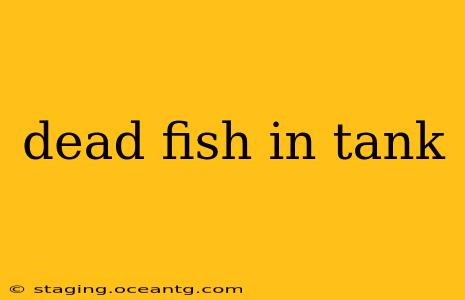Finding a dead fish in your aquarium is disheartening. It's a common problem, but understanding the causes can help you prevent future losses and maintain a healthy tank environment for your remaining fish. This comprehensive guide explores the reasons why fish die, how to prevent such occurrences, and what steps to take when you discover a deceased fish.
Why Did My Fish Die?
This is the first, and often most pressing, question for any fish keeper. Several factors can contribute to a fish's demise, and often, it's a combination of issues rather than a single cause.
Water Quality Issues: This is the most common culprit. Poor water quality encompasses several problems:
- Ammonia Poisoning: Ammonia is a toxic byproduct of fish waste and uneaten food. High levels are lethal. Regular water changes are crucial.
- Nitrite Poisoning: Nitrites are also toxic and result from the breakdown of ammonia. A properly cycled tank converts nitrites to nitrates, which are less harmful.
- Nitrate Buildup: While less toxic than ammonia and nitrites, excessively high nitrate levels can stress fish and make them susceptible to disease.
- pH Imbalance: Fish require a specific pH range. Fluctuations outside this range can cause stress and death.
- High or Low Temperatures: Sudden temperature changes or extremes can shock and kill fish.
Disease and Parasites: Fish are prone to various diseases and parasitic infections. Symptoms can range from lethargy to visible lesions. Quick identification and treatment are crucial.
Aggression and Bullying: In community tanks, larger or more aggressive fish can bully smaller or weaker tank mates, leading to injury and death. Careful fish selection is paramount.
Old Age: Like any living creature, fish have a lifespan. Knowing the expected lifespan of your fish species helps manage expectations.
Poor Diet: An inadequate or unbalanced diet can lead to malnutrition and weakened immune systems, making fish susceptible to diseases and death.
What to Do When You Find a Dead Fish?
- Remove the Fish Immediately: To prevent water contamination, promptly remove the deceased fish from the tank using a net.
- Dispose of the Fish Properly: Wrap the fish in a sealed bag and dispose of it according to local regulations. Avoid flushing it down the toilet.
- Test Your Water: Perform a thorough water test to check ammonia, nitrite, nitrate, and pH levels.
- Perform a Partial Water Change: Replace a portion of the tank water (typically 25-50%) with dechlorinated water to improve water quality.
- Observe Remaining Fish: Carefully monitor the health of your remaining fish for any signs of illness or stress.
- Identify Potential Causes: Based on your water test results and observation of your fish, try to determine the cause of death.
How to Prevent Fish Death?
- Proper Aquarium Setup: Ensure your tank is properly cycled before adding fish. This establishes beneficial bacteria that break down harmful waste products.
- Regular Water Changes: Perform partial water changes weekly or bi-weekly to maintain good water quality.
- Appropriate Filtration: Invest in a reliable filter system that's appropriately sized for your tank.
- Monitor Water Parameters: Regularly test your water parameters to catch any imbalances early.
- Quarantine New Fish: Always quarantine new fish for several weeks before introducing them to your main tank to prevent the introduction of diseases.
- Appropriate Tank Mates: Choose compatible fish species that won't bully or compete for resources.
- Proper Feeding: Feed your fish a balanced diet in appropriate portions. Avoid overfeeding.
What if I Find More Than One Dead Fish?
Finding multiple dead fish is a serious indication of a problem. It's critical to identify and address the underlying issue immediately, focusing on water quality and potential disease outbreaks. Consider seeking advice from an experienced aquarist or your local fish store.
This information is intended for educational purposes only and should not be considered a substitute for professional veterinary advice. If you are concerned about the health of your fish, consult a qualified veterinarian specializing in aquatic animals.
